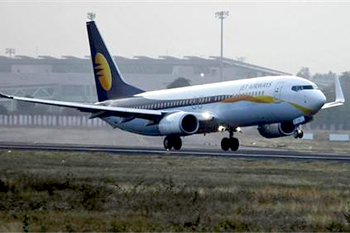 New Delhi, Nov 13: Paving way for closure of long- pending Jet-Etihad deal, fair trade regulator CCI on Tuesday approved the proposed acquisition of 24 % stake in the Naresh Goyal-led Indian carrier by Abu Dhabi-based airline.
New Delhi, Nov 13: Paving way for closure of long- pending Jet-Etihad deal, fair trade regulator CCI on Tuesday approved the proposed acquisition of 24 % stake in the Naresh Goyal-led Indian carrier by Abu Dhabi-based airline.
Etihad is acquiring this stake for Rs 2,058 crore in a deal that was announced in April this year, becoming the first-ever FDI (Foreign Direct Investment) in an Indian carrier by an overseas airline.
However, the deal has been stuck for months for want of various regulatory approvals. The clearance by the Competition Commission of India (CCI), whose nod is necessary for any major merger and acquisition deal involving an Indian entity, was among the last regulatory approvals for this transaction.
Among others, the deal has been already cleared by capital markets regulator Sebi, Foreign Investment Promotion Board (FIPB) and Cabinet Committee of Economic Affairs (CCEA).
The deal had to be revised after Sebi raised objections over a previous structure that involved Etihad possibly getting larger control over Jet Airways, which is a publicly listed company in India.
"Considering the facts on record and the details provided in the notice (under relevant section of the Competition Act)... the Commission is of the opinion that the proposed combination is not likely to have appreciable adverse effect on competition in India and therefore, the Commission hereby approves the same," CCI said in an order.
The majority order, passed by CCI chairman Ashok Chawla and four members, said that the approval can be revoked if information provided by Jet and Etihad is found to be incorrect at any time.
However, one CCI member passed a minority order dissenting with the majority view and said the deal could have adverse impact on competition in international air travel market.
Dissenting member Anurag Goel said he was "of the prima facie opinion that the proposed combination is likely to cause an appreciable adverse effect on competition within the market of international air passenger transportation from and to India."
"A notice may, therefore, be issued to show cause to the parties to the combination calling upon them to respond within thirty days of the receipt of the notice, as to why investigation in respect of the proposed combination should not be conducted," his dissent order said.
The Commission said the approval is granted on the basis of "underlying competition assessment" based on information provided by the parties in their notice, which has been modified and supplemented from time to time.
"This approval should not be construed as immunity in any manner from subsequent proceedings before the Commission for violations of other provisions of the (Competition) Act. It is incumbent upon the parties to ensure that this ex-ante approval does not lead to ex-post violation of the provisions of the Act," CCI said.
The regulator also noted that this "approval however, shall have no bearing on proceedings under Section 43A of the Act". Under this section, CCI has powers to slap penalties for non-furnishing of information on M&A deals.
While Jet and Etihad were said to be in discussions for a long time, they had formally announced their proposed deal in April this year.
However, the original deal had hit several regulatory road blocks, primarily on concerns that it could lead to a foreign airline getting control over an Indian company in a sensitive sector like aviation and Jet's public shareholders were being given a raw deal.
Subsequently, the deal was restructured to address the apprehensions of various regulators and other government bodies, such as Sebi, CCI and FIPB.
After the deal, Etihad would have 24 % stake in Jet Airways, main promoter Naresh Goyal would have 51 % and public shareholders would have remaining 25 %.
Besides, Etihad's control over board matters and other business decisions was also curtailed in revised deal.





Comments
Add new comment